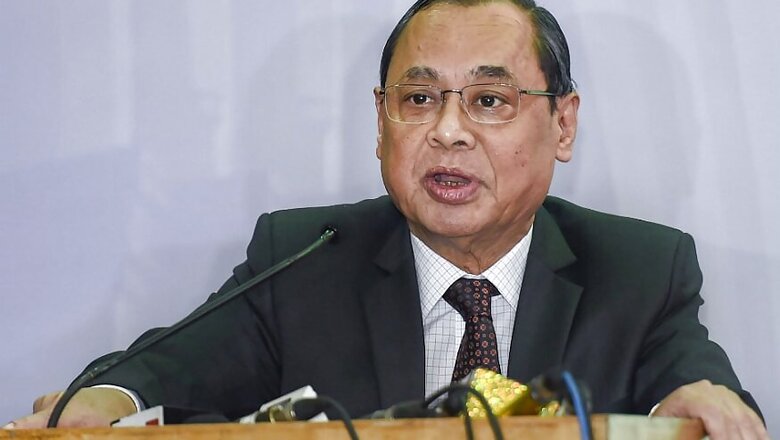
views
New Delhi: Chief Justice of India Ranjan Gogoi on Monday recused himself from hearing a plea challenging the appointment of M Nageswara Rao as interim CBI director. The CJI said he cannot hear the plea as he would be part of the committee meeting to select the next CBI director this week.
The plea, filed by NGO Common Cause, will now be heard on Wednesday in Court No.2.
The high-powered selection committee comprises the prime minister, the leader of the largest opposition party and the CJI or his nominee judge of the apex court.
Common Cause had on January 14 moved the top court opposing Rao's appointment as the interim director and asked for directions for laying down specific mechanisms to ensure transparency in the appointment process to the investigation agency.
It had also sought quashing a January 10 decision to appoint Rao as acting head, contending that it was "illegal, arbitrary, mala fide and in violation of the Delhi Police Special Establishment (DPSE) Act" and the judgement of the apex court in the Alok Verma and Vineet Narain cases.
It contended that the high-powered Selection Committee for appointment of the CBI Director has been completely bypassed by the Union government which has arbitrarily, without any jurisdiction, appointed Rao.
"The appointment of Nageswara Rao as interim CBI Director was apparently not made on the basis of recommendations of the high-powered Selection Committee. The order dated January 10, 2019, states that the Appointment Committee of the Cabinet has approved the appointment of Nageswara Rao 'as per the earlier arrangements'," the NGO said.
"However, this earlier arrangement i.e. order dated October 23, 2018 making Rao the interim Director, had been quashed by this court vide order dated January 8, 2019 as it was made in violation of the procedure for appointment of CBI Director as defined in the DPSE Act," it added.
The organisations has contended that the government still invoked its earlier order which has been quashed to once again make Rao interim director of the CBI even though it was not the competent authority and did not have the powers to make the appointment.
The petition has also said that while the high-powered committee was adequately balanced and provisions exist to safeguard the functional autonomy of the CBI Director, there has been a lack of transparency in the appointment of CBI Director which allows the government to exercise "undue influence" in the appointment process, especially at the stage of shortlisting of candidates.
"The Government of India has attempted to stifle the independence of the institution of the CBI by appointing the Director of the CBI in an arbitant and illegal manner.
"Further, the lack of transparency in the process of appointment prevents any meaningful public scrutiny and allows the government to exercise undue influence in the process, especially at the stage of shortlisting of candidates, thereby undermining the institution of CBI," it has said.
(With agency inputs)












Comments
0 comment